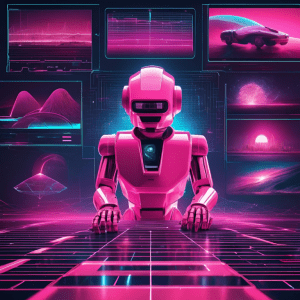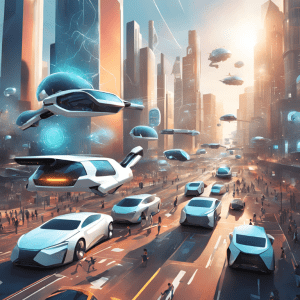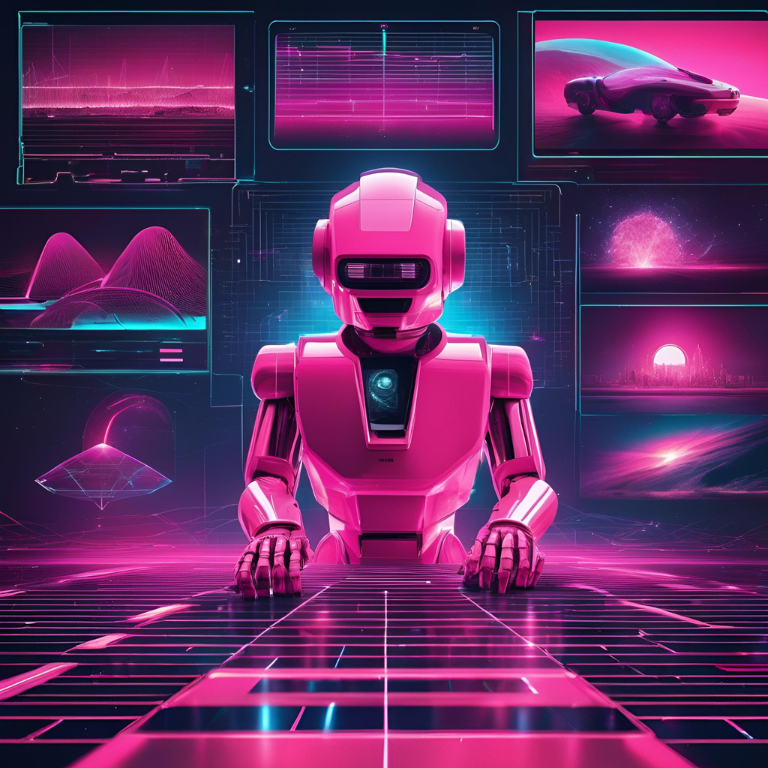Introduction
Artificial Intelligence (AI) has undeniably been a driving force behind technological transformation in recent years, and AI breakthroughs of 2024 are no different. With groundbreaking advancements across various industries, these breakthroughs are not just shaping our future but actively redefining it. From healthcare to education and even entertainment, AI is reaching new heights. But what are the specific AI breakthroughs making waves this year? And how will they influence our everyday lives? Let’s dive into the AI breakthroughs of 2024 that are propelling us toward an AI-driven future.

AI Breakthroughs of 2024: What’s Shaping the Future?
Artificial Intelligence is evolving at an unprecedented rate, and AI breakthroughs of 2024 have already shown remarkable innovations. From enhanced machine learning models to ethical AI development, these breakthroughs in AI are set to transform industries and impact our lives in ways we could barely imagine just a few years ago.
1. Generative AI: The Art of Creation
One of the most talked-about AI breakthroughs of 2024 is generative AI. Unlike traditional AI, which is programmed to perform specific tasks, generative AI can create content—from art to music, text to code—autonomously. With tools like GPT-5, new AI models are becoming increasingly sophisticated, creating artwork and complex narratives once thought to be exclusive to human creativity.
Generative AI isn’t just about novelty—it’s also revolutionizing industries by accelerating workflows. In advertising, for instance, AI-generated images, videos, and even slogans are now being deployed at scale, allowing agencies to respond to market trends faster than ever before. Businesses can now generate thousands of product descriptions or promotional content in minutes rather than hours.
Key Highlights of Generative AI in 2024:
- Advanced Creativity: AI can now mimic various art styles, create music compositions, and even write novels. This extends into areas like fashion design, architecture, and film production, where AI is used to generate fresh ideas.
- Industries Transformed: The entertainment and design industries are already seeing shifts, with AI being used to develop movie scripts, video game levels, digital marketing content, and even customized clothing designs based on user preferences.
- Enhanced Collaboration: Artists and designers can now use generative AI as a collaborative tool, offering suggestions or even generating whole pieces of work that can be iterated upon by human creators.
2. AI in Healthcare: Precision Medicine at Its Best
Another exciting AI breakthrough of 2024 is in healthcare, specifically in precision medicine. AI’s ability to process and analyze large datasets has reached new heights, enabling healthcare professionals to tailor treatments to individual patients like never before. With AI-powered diagnostics, predictive analytics, and personalized medicine, treatments are becoming more accurate and efficient.
AI in healthcare is not only making diagnosis faster but also more affordable. The integration of AI into medical imaging tools is allowing for early detection of diseases, reducing the costs of late-stage treatments. Additionally, AI is being used to streamline administrative tasks such as scheduling, medical coding, and insurance claims processing, freeing up healthcare professionals to focus on patient care.
How AI is Shaping Healthcare in 2024:
- Personalized Treatment Plans: AI analyzes patients’ genetic makeup, lifestyle, and medical history to create tailor-made treatment options. AI tools can recommend the best course of action for conditions like cancer, where treatment options vary based on numerous factors.
- Predictive Diagnostics: AI algorithms can now predict diseases like cancer or heart disease years before they manifest, allowing for early intervention. AI-driven tools can analyze blood tests, medical scans, and genetic data to identify markers of potential diseases with unprecedented accuracy.
- Robotic Surgery: Surgeons are utilizing AI-guided robots to perform minimally invasive surgeries with high precision. These robots, powered by AI, can predict complications and assist with decision-making during surgery.
3. Natural Language Processing (NLP): A Leap in Understanding
Natural Language Processing (NLP) has seen significant advances in 2024. With a deeper understanding of context, sentiment, and nuance, modern NLP systems can communicate with users in a more human-like manner. This AI breakthrough is particularly evident in customer service, where AI chatbots have become indistinguishable from their human counterparts in handling queries.
Beyond customer service, NLP is playing a crucial role in media and entertainment. AI-generated articles, for example, are no longer limited to basic news stories. In 2024, NLP models are being used to create complex narrative stories, conduct interviews, and even moderate debates, showing just how far language understanding has come.
Key NLP Innovations:
- Emotional AI: AI now understands not just what we say, but how we feel when we say it. This emotional intelligence is transforming customer service, mental health apps, and more. For example, AI assistants can now detect stress or frustration in a user’s voice and respond in a more empathetic manner.
- Contextual Awareness: NLP models are better at understanding the context of conversations, leading to more relevant responses and fewer misunderstandings. This has applications in everything from virtual assistants to language translation services.
- Multilingual Mastery: Advanced NLP systems are now seamlessly translating and interpreting languages, making global communication easier than ever. Machine translation tools have become more accurate and nuanced, understanding cultural context and idiomatic expressions better than ever.


4. Autonomous Systems: From Cars to Robots
Autonomous systems, especially self-driving cars and robots, have taken a major leap forward in 2024. The fusion of AI with Internet of Things (IoT) technologies has led to more sophisticated decision-making in machines, allowing them to operate without human intervention in increasingly complex environments.
In transportation, self-driving technology is finally maturing. In urban environments, AI-driven vehicles are beginning to reduce traffic congestion, improve fuel efficiency, and lower accident rates. Logistics companies are adopting autonomous trucks for long-haul journeys, reducing costs and increasing delivery speeds.
Breakthroughs in Autonomous Systems:
- Autonomous Vehicles: Companies like Tesla and Waymo have rolled out more reliable self-driving cars that can handle urban and rural settings with minimal human oversight. 2024 has seen the launch of fully autonomous taxis in several cities, offering safe and efficient rides without human drivers.
- AI-Driven Drones: Drones powered by AI are now being used for everything from agriculture to delivery services, making them more efficient and adaptable to different terrains. These drones can autonomously assess crop health, deliver packages in crowded cities, and monitor infrastructure for maintenance needs.
- Robotic Workforce: In industries such as manufacturing and logistics, robots equipped with AI are not just performing repetitive tasks but also making decisions on the factory floor to optimize productivity. Autonomous robots can navigate complex environments, adjust their operations in real-time, and collaborate with human workers.
5. AI Ethics and Governance: Responsible AI Development
As AI continues to evolve, concerns about ethics and governance have grown. In response, 2024 has seen significant progress in the development of frameworks to ensure responsible AI usage. Ethical AI is now a major focus, as developers and organizations strive to create systems that are fair, transparent, and unbiased.
AI governance is becoming a global issue. Regulatory bodies across the world are taking measures to address AI-related concerns, from data privacy to job displacement. Major tech companies are developing internal AI ethics boards to oversee the use of AI within their organizations and ensure that AI tools are developed with fairness, accountability, and transparency in mind.
Important Ethical AI Trends:
- Bias Reduction: Algorithms are being designed to minimize bias, particularly in sensitive areas such as hiring, healthcare, and law enforcement. Developers are incorporating fairness into the design process to avoid discriminatory outcomes.
- Transparency and Explainability: AI models are now more transparent, allowing users to understand how decisions are made. This is crucial for sectors like finance and healthcare, where AI-driven decisions can have life-altering consequences. In 2024, explainable AI (XAI) has become a standard, with organizations required to show how and why an AI system made a particular decision.
- AI Regulation: Governments are rolling out new regulations to ensure AI is developed and used ethically. This includes requiring organizations to disclose AI’s role in decision-making processes and ensuring AI systems respect privacy laws.
6. AI in Education: A Personalized Learning Revolution
Education is undergoing a significant transformation thanks to AI-powered personalized learning systems. These systems are tailored to individual students’ needs, strengths, and weaknesses, offering a more engaging and effective learning experience.
In 2024, AI is not only assisting students in traditional subjects but also helping them acquire new skills, such as coding, entrepreneurship, and digital literacy. This shift is making education more accessible to people of all ages and backgrounds, breaking down barriers for lifelong learning.
How AI is Enhancing Education:
- Adaptive Learning: AI systems can adjust the difficulty of lessons in real time, ensuring students remain challenged but not overwhelmed. These systems track students’ progress and adjust coursework to suit their learning styles.
- Virtual Tutors: AI-powered tutors provide 24/7 assistance, answering students’ questions and helping them grasp difficult concepts. These virtual tutors offer instant feedback, improving students’ understanding and retention of information.
- Skill Development: In addition to traditional subjects, AI is teaching students digital skills and preparing them for future job markets. Courses on coding, machine learning, and data analysis are being integrated into school curriculums, ensuring students are ready for the future.
FAQs
1. What are the key AI breakthroughs of 2024?
The key AI breakthroughs of 2024 include advancements in generative AI, autonomous systems, healthcare applications, and personalized education.
2. How is AI changing healthcare in 2024?
AI is revolutionizing healthcare with personalized treatment plans, predictive diagnostics, and AI-assisted surgeries, improving patient outcomes and operational efficiency.
3. Why is AI ethics important in 2024?
As AI becomes more integrated into daily life, ethical concerns surrounding bias, transparency, and accountability are crucial to ensuring AI is used responsibly.
4. How is AI improving education in 2024?
AI is providing personalized learning experiences, virtual tutoring, and adaptive learning systems that make education more engaging and accessible.
5. What role does AI play in education?
AI is transforming education by personalizing learning experiences, offering adaptive learning systems, and providing 24/7 virtual tutoring. This allows for more individualized attention and improved educational outcomes for students.
Conclusion
The AI breakthroughs of 2024 are setting the stage for an AI-driven future where innovation knows no bounds. From healthcare to creativity, autonomous systems to personalized learning, AI is becoming more integrated into our lives, offering endless possibilities for growth and advancement. However, it’s also important to address the ethical challenges posed by these advancements to ensure that AI benefits society in fair and responsible ways.

